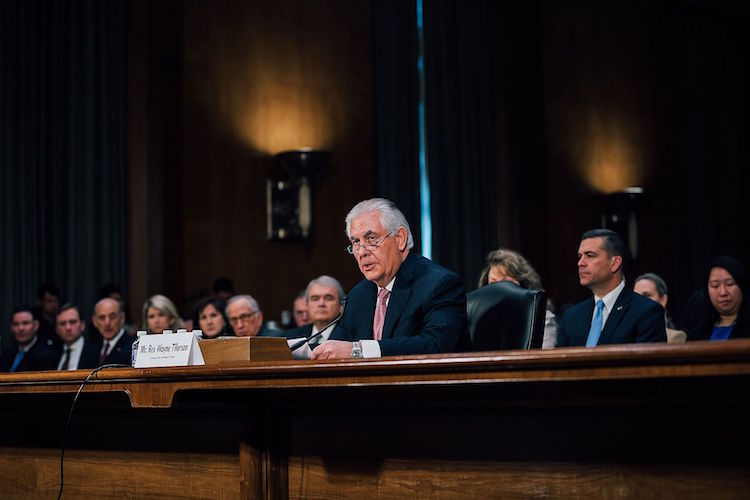By Rodney Reynolds
WASHINGTON DC (IDN) – There is widespread speculation in the U.S. capital that the Trump administration may play down human rights violations worldwide and even withdraw from the UN Human Rights Council in Geneva.
The speculation has been prompted by several factors, including a proposed 37 percent cut in the annual State Department budget, a low-profiled release of the annual U.S. human Rights Report on March 3 (with no briefings, breaking traditions, by the U.S. Secretary of State Rex Tillerson) and his refusal to condemn the civilian killings ordered by the Philippine President Rodrigo Duarte, during Senate confirmation hearings.
The Human Rights Reports are used by the U.S. Legislative, Executive, and Judicial Branches as a resource for shaping policy and guiding decisions, informing diplomatic engagements, and determining the allocation of foreign aid and security sector assistance, says Tillerson in preface to the 2016 Report.
The Reports, he adds, are also used throughout the world to inform the work of human rights advocates, lawmakers, academics, businesses, multilateral institutions, and NGOs.
As Tillerson prepares to head to China, Japan, and South Korea on his first major trip, the Asia advocacy director at Human Rights Watch, John Sifton, says the U.S. Secretary of State seems to be locked in a downward spiral of irrelevance.
“Unavailable for public or media appearances, locked out of most of President Trump’s meetings with world leaders, and reportedly uninvolved in most foreign policy decision-making, Tillerson’s status in the Trump administration is uncertain. It is difficult to discern his larger aims, or the extent of his authority,” writes Sifton in The Hill on March 13.
2It is not exactly clear what the overarching goals of his trip are, and in a marked departure from past practice of recent secretaries, he has barred media from accompanying him, prompting protests from the Washington press corps,” adds Sifton.
The issue of membership in the Human Rights Council (where the US is expected to serve a three year term ending 2019) came up repeatedly at a recent State Department press briefing.
Asked for confirmation, Acting State Department spokesman Mark Toner told reporters March 8 that the U.S. will continue to participate in the current sessions in Geneva.
“I think the Human Rights Council is supposed to go until March 24th. And as I said, we’re there, we’re at the table, we’re working on an agenda, we’ve been elected to a three-year term I think back in 2016, and we’re committed to human rights and fundamental freedoms and working to pursue those.”
Pressed further, he said: “We’re there, we’re a part of that process, we’re bringing an agenda and we’re hard at work on the ground. So as to any rumors that may have been circulating out there, I think they’re just that.”
But he refused to identify what those “rumours” were.
In an assessment of the human rights situation worldwide, the UN High Commissioner of Human Rights Zeid Ra’ad Al Hussein of Jordan told the opening session of the Council he was “concerned” about the new Trump Administration’s handling of a number of human rights issues.
He said greater and more consistent leadership is needed to address the recent surge in discrimination, anti-Semitism, and violence against ethnic and religious minorities.
“Vilification of entire groups such as Mexicans and Muslims, and false claims that migrants commit more crimes than US citizens, are harmful and fuel xenophobic abuses.”
“I am dismayed at attempts by the President (Donald Trump) to intimidate or undermine journalists and judges. I am also concerned about new immigration policies that ban admission of people from six predominantly Muslim countries for 90 days, as well as policies which greatly expand the number of migrants at immediate risk of deportation – without regard for years spent in the US or family roots.”
These new developments, he said, threaten to vastly increase use of detention, including of children. Expedited deportations could amount to collective expulsions and refoulement, in breach of international law, if undertaken without due process guarantees, including individual assessment.
“I am especially disturbed by the potential impact of these changes on children, who face being detained, or may see their families torn apart,” he added.
The Human Rights Council is an inter-governmental body within the United Nations system responsible for strengthening the promotion and protection of human rights around the globe and for addressing situations of human rights violations and make recommendations on them.
The Council is also mandated to discuss all thematic human rights issues and situations that require its attention throughout the year.
Consisting of 47 UN Member States, and elected by the 193-member UN General Assembly, the Human Rights Council replaced the former United Nations Commission on Human Rights.
The Council’s Membership is based on equitable geographical distribution. Seats are distributed as follows: African States: 13 seats; Asia-Pacific States: 13 seats; Latin American and Caribbean States: 8 seats; Western European and other States: 7 seats and Eastern European States: 6 seats.
Members of the Council serve for a period of three years and are not eligible for immediate re-election after serving two consecutive terms. [IDN-InDepthNews – 13 March 2017]
Photo: Rex Tillerson at his confirmation hearing on January 11, 2017. Credit: Wikimedia Commons.
IDN is flagship agency of the International Press Syndicate

